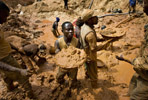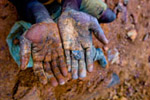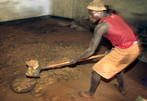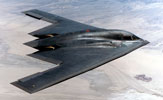The ‘Congo’ Chip: Truly Tasteless Moments in Technology?

Via the Congo Resources blog, I see that microprocessor manufacturer AMD is developing a new chip aimed at making ultra-thin laptops more affordable, and that they have decided to name the new technology … ‘Congo.’ Did someone actually think it was a good idea to name a microchip after the Congo? It is, after all, the place where trade in minerals vital to technology like ultra-thin laptops is fueling the deadliest conflict in the world. Okay, AMD isn’t one of the 21 companies that Enough has contacted about Congo’s conflict minerals, so I can understand that they didn’t get the ...
Pakistan’s Dawn on Darfur
When I was working on Pakistan’s national elections last year, the English language daily newspaper Dawn was the must-read voice of the country’s growing moderate, intellectual, and secular middle class (remember those lawyers who used nonviolent activism to help bring the Musharraf regime to an end and subsequently forced the new civilian government to restore the rule of law). So, despite having plenty of internal concerns these days, I was pleasantly surprised to see Dawn looking well beyond Pakistan’s borders and taking the Arab League to task for supporting Sudanese President Omar al-Bashir on Darfur. Key quote: Taking the stance ...
Minerals Down Under
Down under, the Sydney Morning Herald has an interesting article on the trade in tantalum, one of the 3T minerals from which armed groups profit in eastern Congo. Australia has a unique perspective on the minerals trade—it’s home to the largest tantalum mines in the world, but they’re currently mothballed, partly because they cannot compete with inexpensive tantalum that is sourced from Congo’s war zone. More press like this will help keep the pressure on electronics companies to demand more responsible behavior from actors in the supply chain, but it’s important to keep in mind that if companies were simply ...
Traxys and Conflict Minerals in Congo
Interesting news from the world of conflict minerals: Bloomberg and Reuters are reporting that Traxys, a European metals dealer implicated by U.N. investigators for allegedly buying minerals from militias in Congo, has announced that it will cease purchasing minerals from Congo’s eastern provinces. In December, the U.N. Group of Experts tasked with monitoring the arms embargo in Congo reported that Traxys purchased cassiterite (tin ore) and coltan (tantalum ore) from four Congolese buying houses, known as comptoirs, which had purchased these minerals from sources directly linked to the FDLR rebels, who have recently engaged in a bloody bout of reprisal ...
Phillips and Nintendo Respond to Congo Activists
Like other activists who emailed the 21 largest electronics companies to urge them to sign the Conflict Minerals Pledge, I recently received a couple of responses, one from Phillips and another from Nintendo. The Phillips reply is broadly representative of how the electronics industry has responded to this issue. They “share the concern regarding poor social and environmental practices within the metals supply chains and consider mining activities that fuel conflict unacceptable.” Phillips, like many other companies, receives declarations from its suppliers that they do not source tantalum (one of the 3T minerals, sometimes known as “coltan”) from the Democratic ...
The Corporate Connection to Crimes Against Humanity in Congo

Enough’s latest strategy paper, “A Comprehensive Approach to Congo’s Conflict Minerals,” proposes a new strategy to sever the links between the trade in valuable minerals essential to everyday electronics products such as cell phones and the ongoing crisis in the Democratic Republic of the Congo, home to the worst sexual violence in the world. In eastern Congo, the same armed groups that reap enormous profits from the mineral trade regularly commit conscience-shocking atrocities as they jockey to control the region’s most valuable mines. The four most profitable ores produce the metals tin, tantalum and tungsten—the 3Ts— and gold, which together ...
Minerals Fuel Atrocities in Congo

From the sound of some rather alarmist recent headlines, one might get the impression that Enough is calling for a boycott of Congolese minerals, which will put miners out of work and create a humanitarian catastrophe in eastern Congo. We are not calling for such a boycott, as explained in our frequently asked questions about conflict minerals. Consumer pressure on corporations to ensure that they are not purchasing minerals from armed groups is a critical pressure point that can improve conditions on the ground for Congolese civilians who continue to be targeted by armed groups on all sides of the ...
The End of the DPA?
At first glance, the White House press release announcing General Gration as the U.S. Special Envoy for Sudan contains the standard litany of boilerplate U.S. policy on Sudan: humanitarian concern, support for peacekeepers, and urging implementation of the North-South peace agreement. But conspicuously absent from this list is any mention of the Darfur Peace Agreement, or DPA, the ill-conceived peace agreement manufactured by the U.S. government back in 2006 that was signed by only one of the rebel factions. Despite the fact that violence in Darfur actually increased following the DPA, it was regularly and reverentially referenced by the Bush ...
The Debate on Air Power and Darfur

The appointment of retired Air Force General Scott Gration as Special Envoy to Sudan, as John Norris notes, means that someone who actually knows what he is talking about will be at the center of the debate about the potential role of air power in responding to the crisis in Sudan. Ever since General Merrill A. McPeak and Kurt Bassuener revisited the prospect of a no-fly zone in the Washington Post, debate within the blogosphere on the prospect of a no-fly zone or other measures to interdict Sudan’s bombing of civilian targets has heated up: Diane Marie Amman of IntLawGrrls ...

